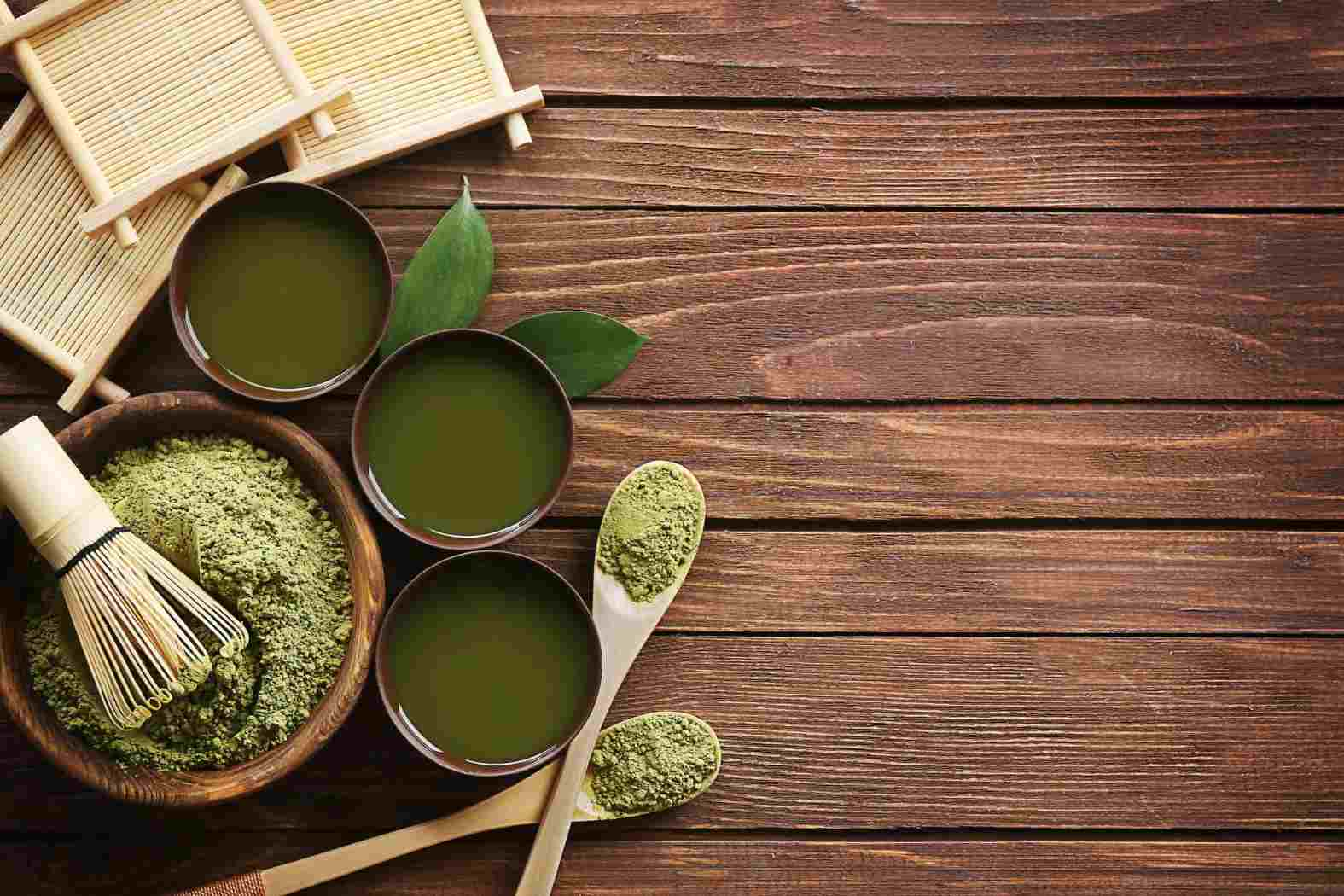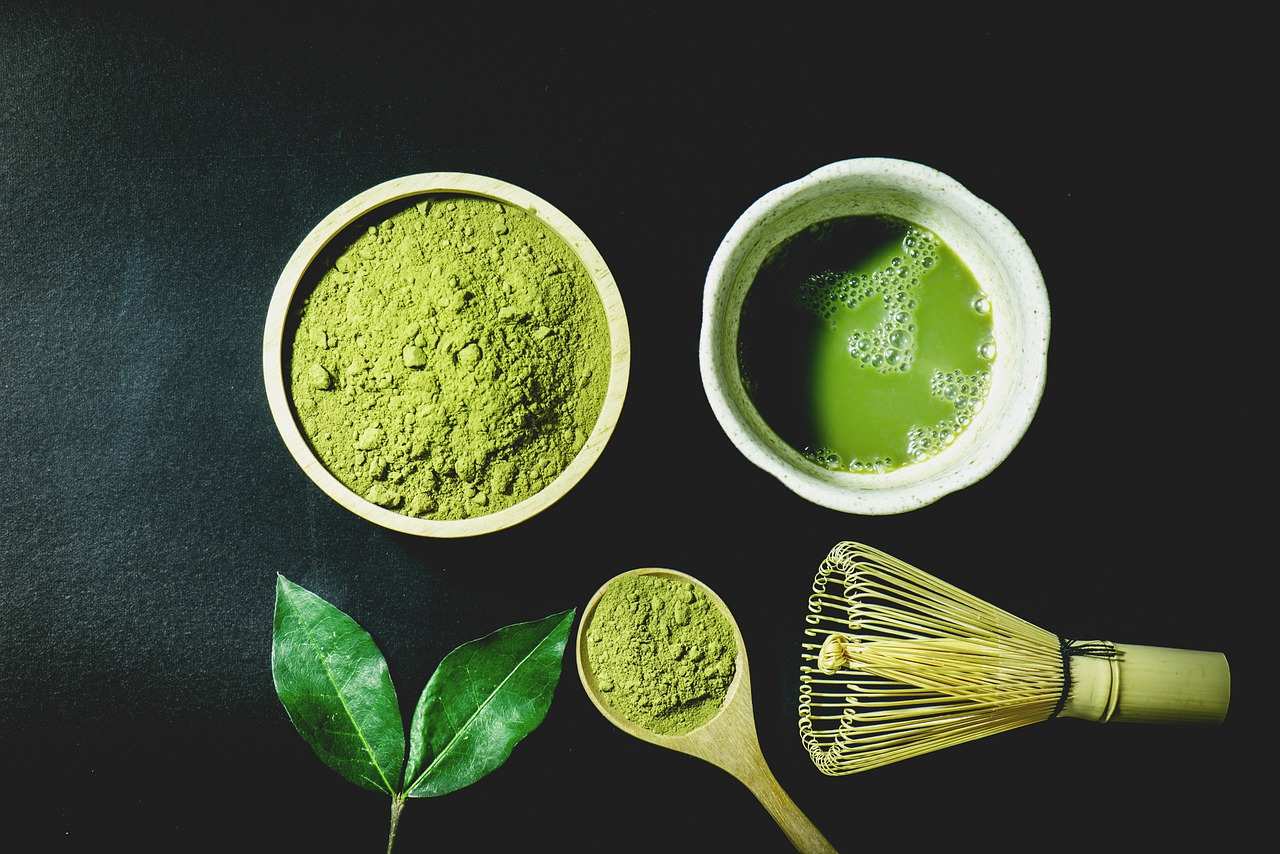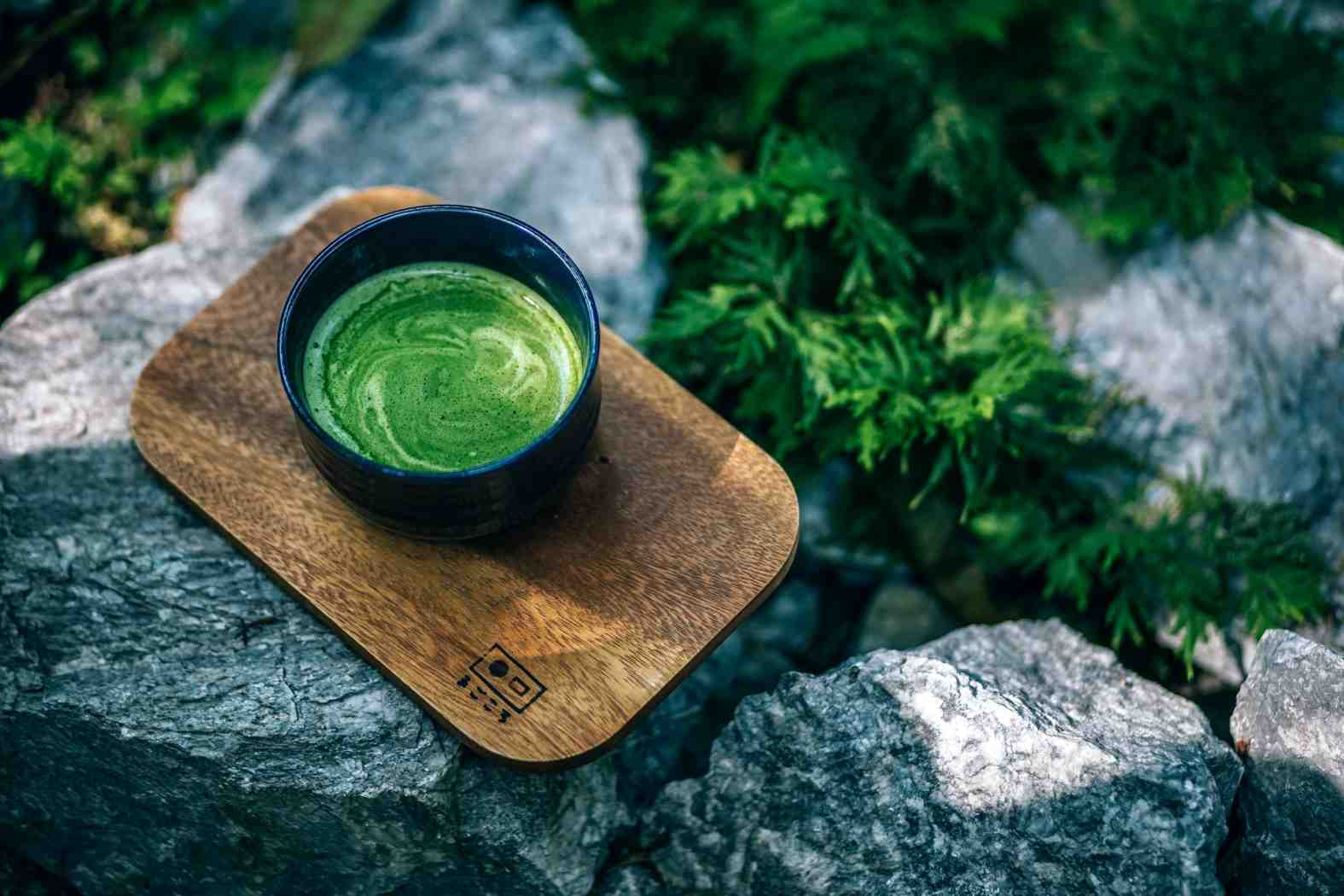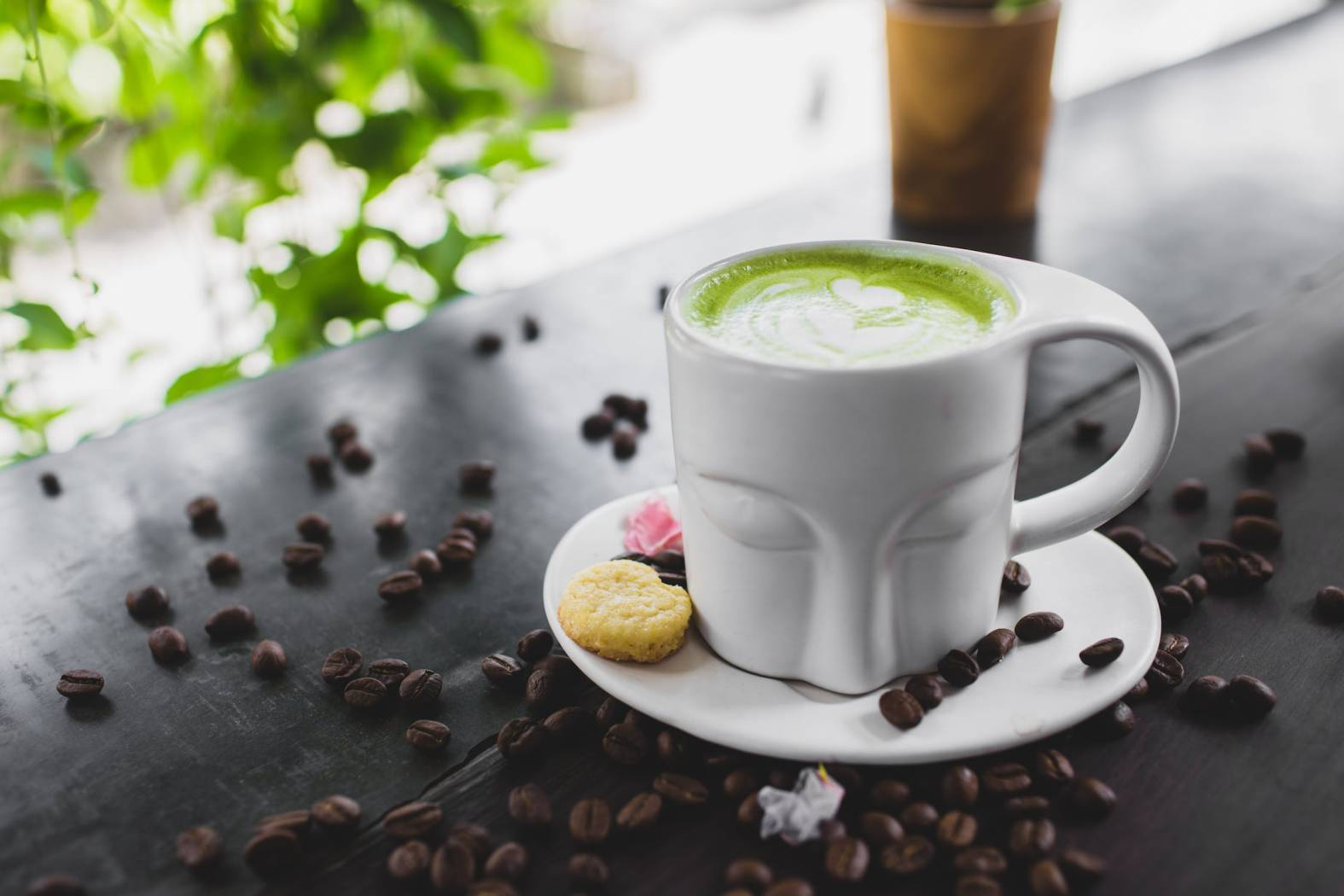The "Matcha Tea" Trend

Who would've thought drinking matcha can positively affect your overall health? Matcha tea is a high-quality drink made from green tea extract, typically in powder form.
The taste is delicately bitter combined with a vegetal taste. It tastes like regular green tea but has a grassy, richer, stronger flavor. This is in opposition to green tea's often light and refreshing flavor.
Matcha tea also has a more intense and vibrant green color, resulting from the pulverized effect of green tea leaves. In that sense, you can say that matcha tea is a concentrated form of green tea.
1.1 Matcha Tea and its Background
Matcha tea originated in China, but the Japanese invented the machinery for its production. While the Chinese merely used the "grinding" method to produce matcha green tea, the Japanese thought of other methods, including shading, steaming, and drying.
Matcha tea has dominated Japan for centuries, particularly in Uji, Kyoto, and Nishio, Aichi prefecture, where it is occasionally used in traditional Japanese tea ceremonies.
1.2 The Emergence of Matcha Tea in the American Community
What's more interesting is that matcha tea is scientifically proven to be more packed with antioxidants and other nutrients than green tea and coffee. One reason is that when you mix in the matcha powder, you pour one whole serving of green tea powder into the hot water (or milk, if you want).
On the contrary, when you make green tea, you steep the tea bag or green tea extract in hot water only for a few minutes and discard it thereafter. Hence, you tend to consume a complete green tea leaf when you drink matcha tea than green tea.
Due to these amazing health benefits of matcha tea, the trend has traveled from Japan to more Asian borders until it reached the premise of the United States. Drinking matcha tea has become one of the fastest-emerging health trends among Americans. There has been over a 200% growth in registered matcha-flavored drinks in the United States in recent years.
Americans quickly added matcha tea to foods and beverages such as smoothies, milk tea, cakes, cupcakes, ice creams, cookies, and chocolates, and even in specific recipes such as matcha pancakes and brownies.
1.3 Rundown
So, should you jump on the trend immediately and add matcha tea to your morning routine? Is matcha tea good, with no hidden side effects that could threaten your health?
Well, before you hop into the trend, let us first discuss matcha and the various health benefits it can provide. Controversially, we will also talk about the negative side effects of matcha tea, which are often not discussed.
THE DIFFERENT HEALTH BENEFITS OF MATCHA TEA

-
IT HELPS MAINTAIN YOUR HEART HEALTHY AND STRONG
There are a lot of micronutrients present in matcha. One that stands out the most is a plant component called epigallocatechin gallate (EGCG), which are natural antioxidants that help with cell damage. Moreover, it has anti-inflammatory properties. Plus, it can also aid in weight loss.
Perhaps this compound's most important health effect is its capacity to lessen the risk of heart disease.
As such, it has positive effects on cardiovascular and metabolic health. It is known to have anti-atherosclerosis, anti-cardiac hypertrophy, anti-myocardial infarction, and anti-diabetes properties, which can help the body maximize its healing properties.
Matcha helps maintain a healthy heart because it supports the healthy functioning of the cardiovascular system. It is an effective drink that lessens the risk of plaque build-up.
Next, it can prevent the thickening of heart tissue. In addition, it can prevent life-threatening health complications such as heart attack or cardiac arrhythmia. -
IT IS OVERLOADED WITH ANTIOXIDANTS
Matcha, along with green tea, is overloaded with antioxidants. So, what do antioxidants do to our bodies?
Antioxidants help eliminate bad molecules from our bodies, decreasing oxidative stress. They also protect our body cells from damage caused by unstable molecules, which are also known as free radicals.
Flavonoids
In addition, matcha tea contains flavonoids, which are plant-based compounds or "metabolites" that can positively influence cell signaling pathways.
As such, it contains many health benefits like anti-inflammatory and antimicrobial activities for the body and generating a series of antioxidant effects. Additionally, it can also help with dental problems such as tooth decay.
Catechins
Catechins, a class of plant compounds, are another antioxidant present in matcha. These natural antioxidants can help the body stabilize damaging free radicals, which is important because free radicals can damage cells and cause chronic diseases.
A study concluded that matcha tea has at least over a hundred times the number of catechins as regular green tea. This is because when you drink matcha, you simply mix the powder with boiling water, which ultimately retains all the nutrients from the leaf.
On the other hand, when you drink green tea, you only steep the tea leaves in the hot water and discard them afterward.
In conclusion, drinking matcha tea can decrease the damaging effects of the so-called free radicals and boost the body's overall antioxidant activity. Hence, adding matcha tea to your diet will help you lower your risk for several chronic diseases, such as heart disease and diabetes.
-
IT BOOSTS ANTI-CANCER ACTIVITIES IN THE BODY
One of the most powerful components of matcha tea is its anti-cancer properties. Catechins and gallic acid, two significant phytochemicals in the tea, are widely used in chemotherapy treatments to heal or prevent cancer. Due to its potential benefits in chemotherapy drugs, matcha tea is also being further investigated.
In line with this, matcha is scientifically proven to be full of health-promoting compounds, which show significant associations with cancer prevention. A study published in the National Library of Medicine concluded that the green tea extract of matcha can decrease tumor size and slow down the development of breast cancer cells in rats.
Furthermore, another study found that the EGCG in matcha tea effectively eradicates the risk of skin, lung, and liver cancer.
These tests and experimentation studies were based on animal studies. Experts are still investigating how these results can be applied to humans.
-
IT AIDS WEIGHT LOSS PROCESSES
According to the National Institutes for Health, matcha green tea can accelerate energy expenditure and fat oxidation, reducing the risk of lipogenesis and fat absorption. Overall, drinking matcha tea can help aid a healthy weight loss journey.
Go get that weight loss supplement you bought from the drugstore. You'll be surprised that "green tea extract" is commonly used in dietary pills or supplements. Matcha green tea can help accelerate weight loss by speeding up metabolism and boosting your body's fat-burning abilities.
One study supported the idea that drinking green tea extract (a large component of matcha tea) can increase fat-burning processes by at least seventeen (17) percent. On the other hand, another study found that people who used a supplement with green tea extract showed significant improvement in their energy expenditure, in contrast to the results of a placebo.
Ever heard of a yoyo effect in diet? Well, good news. Some studies show that drinking matcha green tea can reduce your body weight and help maintain it.
-
IT IS KEY TO A HEALTHY, GLOWING SKIN
Did you know that matcha tea can also positively affect our skin? Well, news flash! Matcha powder and green tea extract are not only exclusively good for internal conditions but also contain essential nutrients that can give your skin a radiant and healthy glow.
Green tea's components have been proven useful in topical effects, promoting skin regeneration and aiding wound healing. It can also treat certain epithelial conditions, such as aphthous ulcers.
Moreover, it can help cure skin diseases such as psoriasis, rosacea, and actinic keratosis. Matcha tea's healthy components, including EGCG and caffeine compounds, make it suitable for your skincare routine. You can occasionally use it as a face mask to subdue redness and swelling.
Fundamentally, matcha tea is one of the keys to healthy and glowing skin!
THE POTENTIAL NEGATIVE EFFECTS OF MATCHA

There are two sides to every coin. This means that, despite the many health benefits of matcha, it can cause various side effects to our bodies, too.
-
IT MAY UPSET YOUR STOMACH
There is the effect of the so-called tannins that are popular in matcha. It is composed of symptoms such as nausea, especially when a tannin-containing drink or food is consumed on an empty stomach. It is also associated with disrupting the body's capacity to absorb iron from your food and drink consumption. For example, if you drink coffee the first thing in the coffee, you get mild to moderate heartburn effects.
As such, matcha green tea is also rich in tannin compounds. In particular, the most dominant tannin component in matcha is a catechin called epigallocatechin gallate (EGCG). Fun fact: these compounds are not only rich in antioxidants, but they also help neutralize and stabilize free radicals. These compounds are also responsible for green tea’s sardonic and dry taste.
While this may be good to some, others negatively react to tannins. Especially when tannin is consumed on an empty stomach, it can irritate the already acidic part of your body. As a result, it may cause stomach discomfort, sour stomach, acid reflux, nausea, and vomiting.
If your stomach is overly sensitive, before you drink your matcha, you should do so after a meal or some sort of snack. The bottom line is, don't drink it on an empty stomach first thing in the morning. This is actually how they drink matcha in traditional Japanese tea ceremonies.
-
IT MAY PUT YOU AT RISK OF ANEMIA
As mentioned above, green tea and matcha powder contain catechins, which can combine with iron to prevent absorption.
As a result, drinking matcha green tea excessively and for long periods may lead to iron-deficiency anemia. Limit yourself to at least 5-7 cups of green tea daily to avoid this health issue.
As we all know, iron is an essential component that sustains our blood cells and provides our bodies with oxygen-rich blood. So, if you become subjected to iron deficiency, you may experience several symptoms, such as fatigue, body weakness, pale skin, and increased heart rate.
Drinking green tea or matcha powder generally does not result in anemia. However, just like all good things, everything is healthy as long as it is consumed moderately. Also, it will help if you incorporate more iron-rich foods into your diet.
Still, if you insist on drinking more than eight (8) cups of green tea or matcha, consult your doctor. Also, have your iron levels checked and monitored periodically.
-
IT MAY RESULT IN DIARRHEA
Matcha green tea is renowned for speeding up metabolism and enhancing fat absorption.
As such, these two health effects of matcha make it possible for such drinks to support healthy weight management, normalize blood sugar levels, and help your heart stay healthy. However, while this may be good, it can also be bad.
In particular, impaired fat absorption can have negative effects on the body. Sometimes, fat is not completely broken down in our cells, and the body has to find another way to get rid of it.
The "unabsorbed" fat passes through the digestive tract and combines with stool. When these fatty stools fail to bind up, they result in loose, watery, and more frequent bowel movements called diarrhea.
This is because the caffeine in matcha can exacerbate the passage of indigestible food in your systems at a more frequent rate. So, if matcha tea has this effect on you, it is advisable to at least limit yourself to one cup a day. Otherwise, you may try incorporating more fiber-rich foods into your diet to compensate.
-
IT MAY LEAD TO INSOMNIA
This is one of the negative effects that matcha tea may bring to your body. This is due to the caffeine content of matcha, which may range from 70 to 140mg.
That is why drinking matcha tea more than the recommended amount may lead to you losing sleep. You may also have difficulty sleeping at your bedtime or at least achieve one restful sleeping session.
As such, when you become sleep deprived, it may result in various health complications such as high blood pressure, diabetes, or heart failure.
The main thing here is that sleep is an important factor in your health. It should go hand-in-hand with your diet and exercise. While matcha can stimulate physical energy, having too much of it is proven to result in insomnia. So, drink moderately to maximize its health benefits.
For safety precautions, any caffeine-containing drink should be avoided by breastfeeding and pregnant women as it may pose several health threats to the mother and the baby.
-
IT MAY EXPOSE YOU TO TOXIC CHEMICALS
You may also be exposed to toxic chemicals like lead, arsenic, and fluoride when you drink matcha tea. These chemicals are drawn from the soil where the camellia sinensis tea plant is grown and cultivated.
Hence, it is recommended that you buy and drink organic matcha. This way, you can rest assured that your matcha powder is free of toxins and other heavy metals.
FINAL THOUGHTS

To conclude, drinking matcha tea has many health benefits. However, you should also note its possible side effects so you may avoid them in the long run.
Drinking matcha tea should be a great addition to your healthy routine, so it should not result in or pose negative health implications for your body.
Like all good things, matcha is good if consumed in moderation. To maximize its health benefits, limit your intake to the recommended amount.
← Older Post Newer Post →





